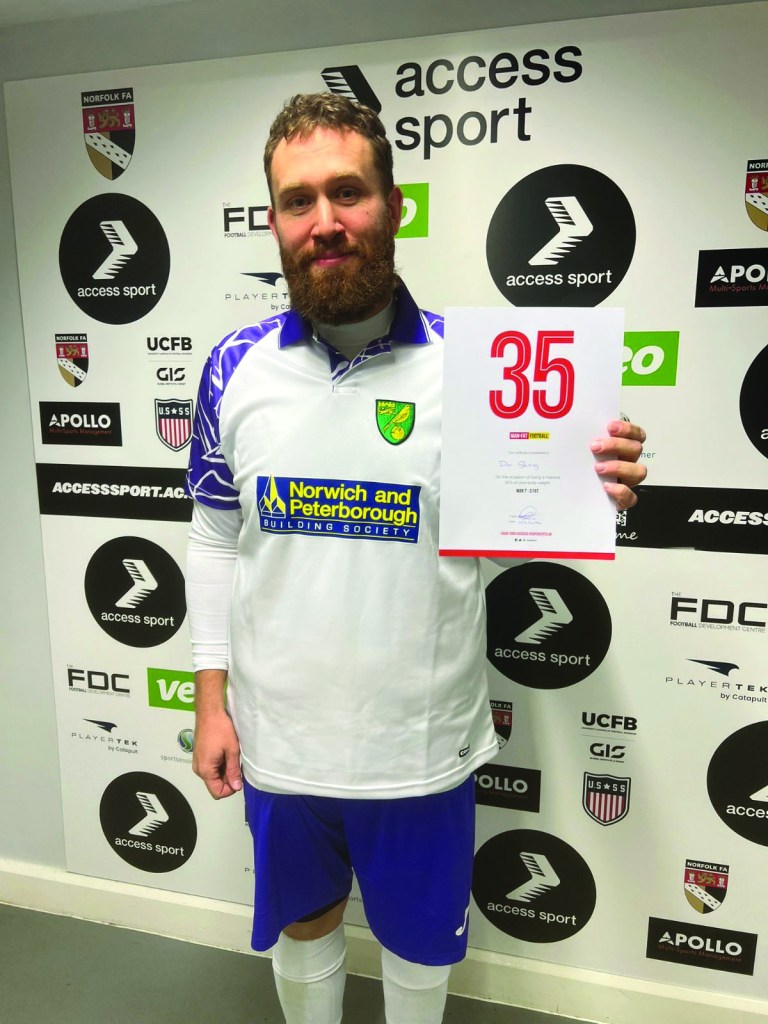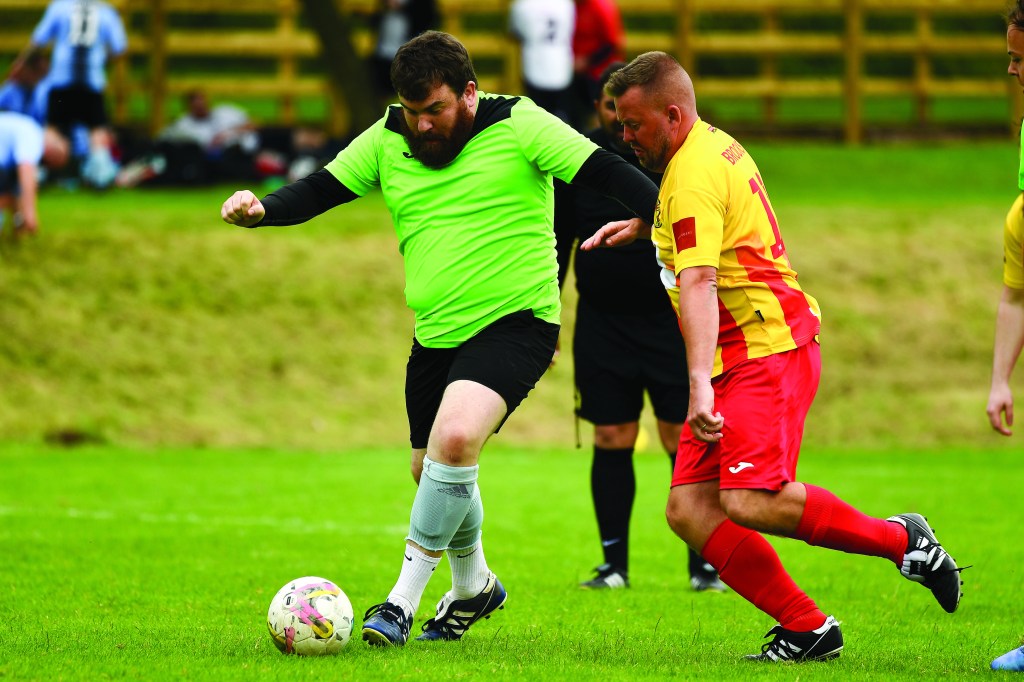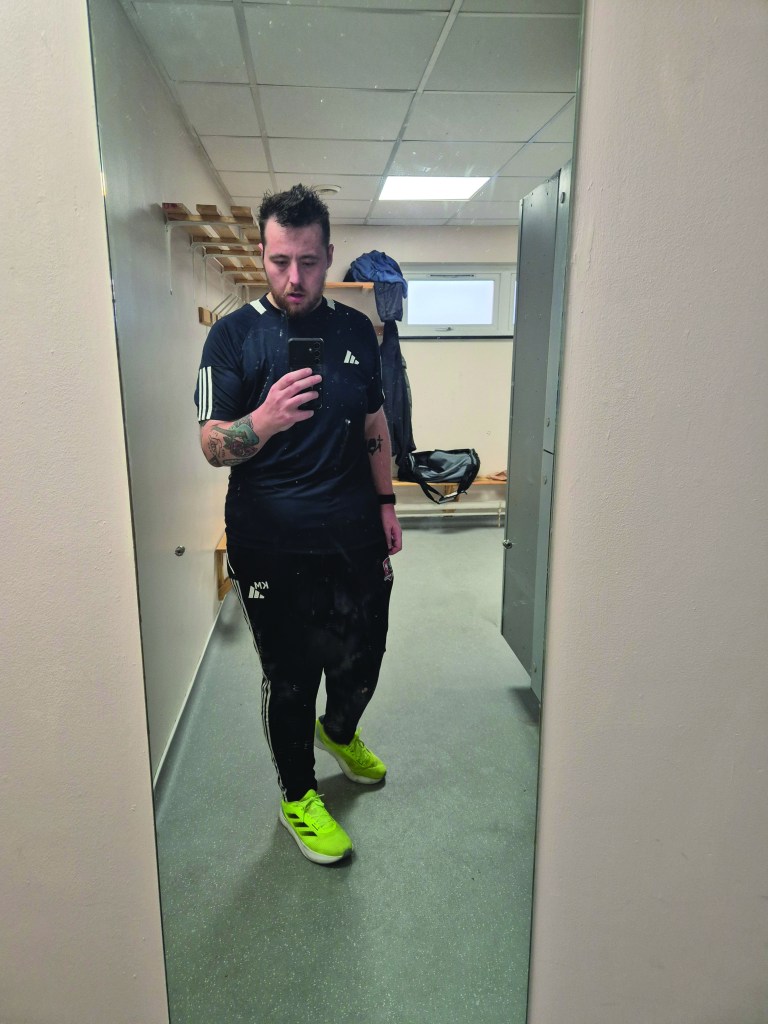How the MANvFAT football-based weight loss programme is changing lives for men around the world
Dan Shilling is a winner on the football pitch and doesn’t mind being a big loser off of it. “I’ve lost around 61 kilograms now – just under 10 stone. Most of that’s come off in the last 15 months,” explains Dan, 39, from Norfolk.
Dan is an offshore worker and father of two who thanks to MANvFAT football has gone from struggling to walk to a helicopter without sweating, to running half marathons and playing regular five-a-side with Norwich West MVF.
“I’d always been quite sporty as a kid and even played Saturday and Sunday football league in my 20s,” says Dan, echoing a story that chimes with many MANvFAT players in the UK and beyond. “But once my partner and I had our first child, I couldn’t really justify spending all weekend on the pitch. I kept eating like I was still training, and slowly the weight just piled on. Before I knew it, I was pushing 26 stone.”
Dan concedes that along with letting the football take a back seat, his diet didn’t help his cause either. “I’m the kind of person who, if food’s there, I’ll eat it. Five Mars bars in the cupboard? I’ll eat all five. I wouldn’t think twice about having a six-piece KFC on a long drive up to Aberdeen.”

“Plus, with the offshore lifestyle, you’re surrounded by food 24/7 – cooked breakfasts, big lunches, cakes, toasties – and you feel like you have to eat because you don’t get another chance.”
Although Dan used the gym at the offshore rig and occasionally played five-a-side with mates he found himself fighting a losing battle with his weight. “I was too heavy to do the things I used to enjoy. I stopped playing football when I couldn’t keep up with the lads, and that just made it harder.”
Salvation came in the shape of an advert on Facebook for a MANvFAT football tournament. “I entered but the one closest to me, in Norwich, was full, so I ended up playing at Ipswich. I’m a Norwich fan and I wore my club colours – which made for some interesting encounters with Ipswich fans on the pitch – the ref definitely looked the other way a few times!”
Goals, gains, and group chats
When journalist Andrew Shanahan found himself in a weight-loss meeting about the menstrual cycle, he realised just how alienating traditional weight-watching programmes could be for men. As one of only a handful of men in the room, the experience highlighted how male obesity often went unaddressed in ways that truly resonated with the people affected.
That lightbulb moment, back in 2014, sowed the seeds for what, by 2016 had become the football-focused weight loss programme that’s now transforming thousands of lives across the UK and beyond.
“What began as a modest online forum and resource hub for men trying to lose weight has grown into this nationwide initiative,” says Matt Hudson, a member of the MANvFAT HQ team and employee of Thrive Tribe, the parent organisation that now manages the programme. “The first season proved the concept could work. The key to it was peer-to-peer accountability. You’re in a team, so you’re not doing it on your own.”
In 2019, Thrive Tribe – specialists in health behaviour change – took majority ownership and further developed the structure, the resources, and the clear focus on sustainable, safe weight loss. Fast forward to today, and the numbers tell their own story.
As of Spring 2025, MANvFAT boasts 157 football clubs across the UK, involving around 8,500 participants every week.
Crucial to Man v Fat’s success is accountability. Players measure their body fat percentage each week. Those that have reduced their percentage score points towards their team’s tally. Goals are awarded for weight loss, consecutive weeks of weight loss, hitting milestones – like a BMI of 25 – and tracking your dietary intake. ‘Own goals’ are conceded for putting weight on. (see table).
Over the course of a short 12-week season each player’s goals add up each week. “The result of the match on the night isn’t the be all and end all. Whatever their abilities on the pitch, we want our guys to feel that they can contribute to their team’s success in some way,” explains Matt Hudson.
“Whether it be tracking their food and drink during the week or making sure they hit the scales lighter than they did a week before, our men enjoy that accountability and the support of their teammates to succeed.”
After 14 weeks the teams are switched around to maintain momentum, meet new team-mates and avoid things getting too cliquey. While weight loss is the initial draw, the programme has evolved into a much broader force for good. “It’s one part of many now,” says Matt Hudson. “For most men, it’s about finding community – connecting with like-minded guys in the same stage of life.”

That demographic, typically men aged 35–50, often faces challenges in making new friends, battling loneliness, and struggling to prioritise their health. MANvFAT clubs that truly thrive are often those that develop their own micro-communities: climbing challenges like Snowdon, coffee meet-ups, five-a-side spin-offs. “They run with it themselves,” Matt adds. “And that’s where the real magic happens.”
More than managers
Unlike standard sports programmes, MANvFAT coaches are not trained football managers. They’re health and wellbeing professionals, behaviour change experts, or even graduates of the programme itself – men who have walked the walk.
“Over a third of coaches are former members who returned to support others,” explains Matt Hudson. All clubs follow strict safety protocols, including mandatory defibrillators on-site and coach training in first aid and safeguarding. “Participants also sign health responsibility statements to acknowledge their role in managing their wellbeing.”
As part of the MANvFAT 10th anniversary of football many of its most successful weight loss champions will be taking part in an ‘Amazing Losers’ match at Brisbane Road, the home of Leyton Orient on May 24th. With former Premier League managers Steve Coppell and Brian McDermott in charge of two teams with a combined weight loss of around 2000 kg (315st).
Both Dan Shilling and Mike Palmer will be among the 36 players invited to take part, along with Tom Barry, 32, originally from Grimsby and now living in Exmouth, Devon. Tom will also be featuring in an Exeter team playing in the MANvFAT national tournament in June.

“Even when we have friendly weeks without official weigh-ins, I still bring my scales,” says Tom, who’s down to 48% of his original 160kg (25 st) bodyweight.
Tom admits to feeling anxious about going along at first. “I didn’t know anyone, didn’t know what to expect – but everyone was so welcoming. No egos, no pressure. It’s competitive, but not in a toxic way. Even when we lose, the atmosphere is great.”
For goalkeeper Tom, playing football every week forces him to do the exercise he isn’t able to get through work. “I have a desk job and that’s a big factor. When I worked in a bar before I was always on my feet and busy. Now football is my main activity and accountability is a key driver.”
The concept is so successful it’s expanded into other sports, with a dozen rugby clubs now running MANvFAT Rugby, and an international footprint beginning to emerge with soccer-based clubs already active in Florida and New York, and more set to launch in Texas.
• To discover more about MANvFAT t programmes and your nearest team head to https://manvfat.com/








